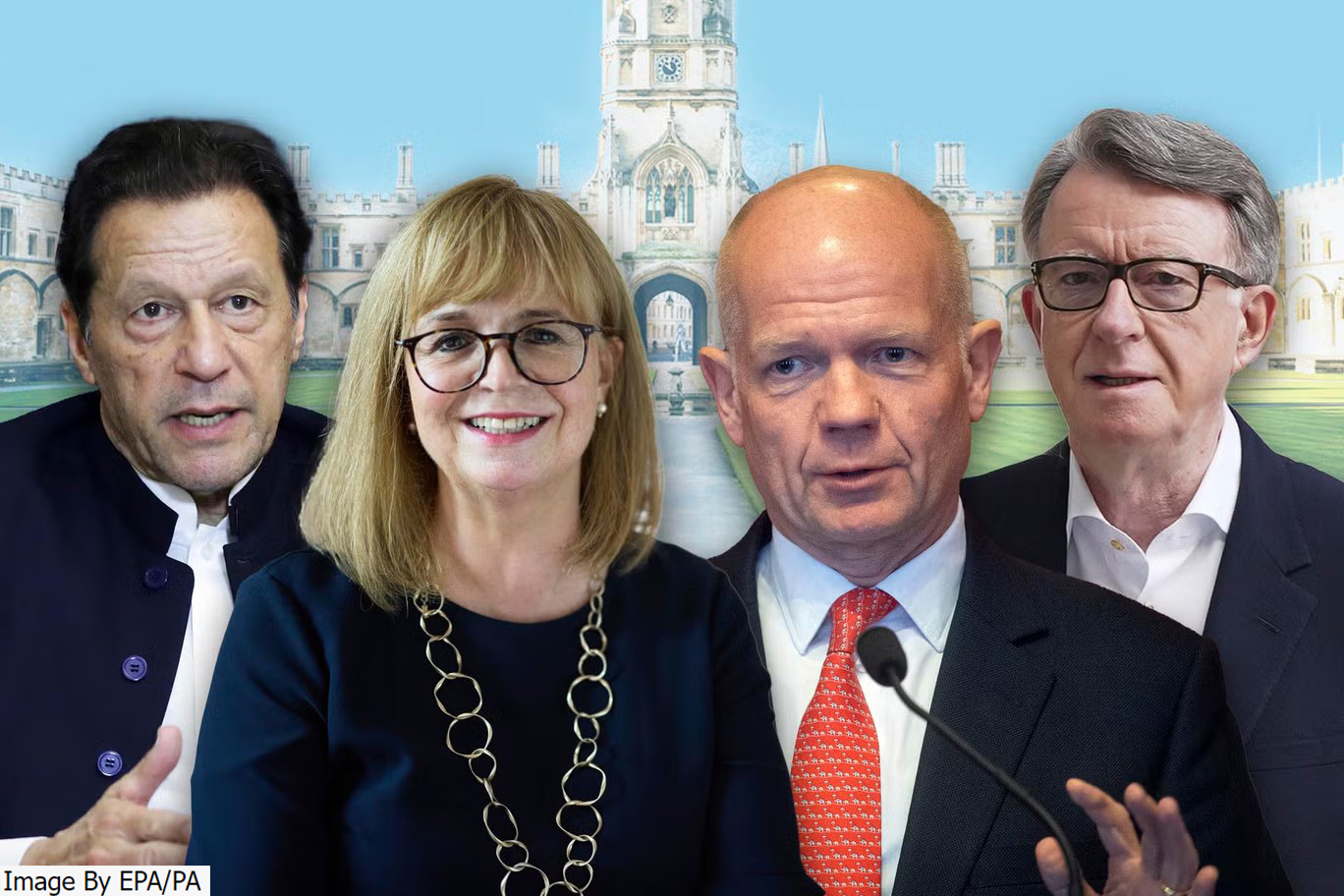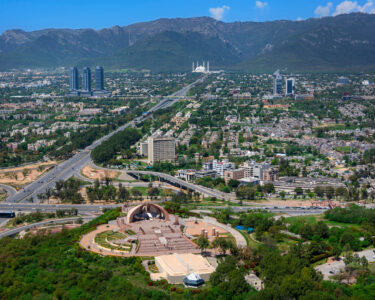Abstract
Imran Khan, former Prime Minister of Pakistan and leader of the Pakistan Tehreek-e-Insaf (PTI) party, has entered the race for Chancellor of the University of Oxford. His candidacy has ignited significant debate, raising legal, political, and ethical concerns. This paper examines Khan’s bid in light of UK legal frameworks, his controversial political career, and broader global academic expectations. Furthermore, it analyzes what Khan’s potential election as Chancellor would mean for his political career in Pakistan, with a focus on how this role could represent an orchestrated exit from Pakistan’s volatile political arena, possibly facilitated by the country’s military and political establishment.
Introduction
The Chancellor of the University of Oxford holds a highly ceremonial role, yet it is deeply symbolic, reflecting the values and vision of one of the world’s leading academic institutions. The election of Imran Khan, a polarizing figure both in Pakistan and globally, raises key questions about his suitability for the role. This paper delves into the legal and ethical considerations surrounding Khan’s candidacy and explores how this move could signal a broader strategic shift in his political trajectory, particularly within the context of Pakistani politics. Is Khan’s candidacy a carefully calculated exit from the political fray in Pakistan, engineered by the military establishment? Could the role of Chancellor provide a soft landing for a leader whose political career has been marred by controversy and legal troubles?
Legal Framework Governing the Oxford Chancellorship
1.1. Regulation 7(d) of Oxford’s Council Regulations
The candidacy of Imran Khan must be viewed through the lens of Oxford’s governing regulations. Regulation 7(d) of the Council Regulations 8 of 2002 outlines the eligibility criteria for individuals holding roles as trustees of the university, including the Chancellor. These criteria emphasize personal integrity, compliance with legal standards, and the fitness of candidates to serve as representatives of the university.
Imran Khan’s criminal conviction in the Tosha Khana case, in which he was found guilty of profiting from state gifts while in office, presents a significant barrier to his candidacy. Section 178 of the Charities Act 2011 explicitly disqualifies individuals with criminal convictions from holding trustee roles in registered charities, a category under which Oxford falls. King’s Counsel Hugh Southey’s legal opinion reinforces this, asserting that Khan’s conviction likely renders him ineligible under UK charity law.
1.2. The “Fit and Proper Person” Test and HMRC Guidelines
In addition to legal regulations, the “fit and proper person” test, as defined by HMRC, plays a critical role in determining the suitability of candidates for positions of influence in charitable organizations. This test assesses whether individuals can be trusted to manage charity resources responsibly and act in the best interests of the institution.
Khan’s criminal record, alongside his continued involvement in politically divisive activities, raises concerns about his ability to meet these standards. The question of Khan’s fitness for office is not merely legal; it speaks to the broader issue of whether his leadership would align with Oxford’s values of transparency, integrity, and intellectual freedom. These legal and moral hurdles cast doubt on the feasibility of his candidacy, particularly given the high ethical standards Oxford maintains.
The Political Context: Imran Khan’s Candidacy as a Strategic Exit from Pakistani Politics
2.1. The Decline of Khan’s Political Power
Imran Khan’s political career has seen both remarkable highs and dramatic lows. Elected as Prime Minister of Pakistan in 2018, Khan promised sweeping reforms but was ousted in 2022 following a no-confidence vote. His subsequent political journey has been fraught with legal battles, accusations of corruption, and a growing estrangement from Pakistan’s military establishment. Once seen as the establishment’s favored candidate, Khan has now become a political liability in the eyes of the powerful military and intelligence apparatus that has long shaped Pakistan’s political landscape.
Khan’s bid for the Chancellorship at Oxford, therefore, represents more than a ceremonial aspiration; it may serve as a strategic exit from an increasingly untenable political position in Pakistan. Given his strained relations with the military and the numerous legal challenges he faces, Khan’s shift toward a more symbolic, international role could offer him a graceful exit from the high-stakes world of Pakistani politics.
2.2. The Role of the Military Establishment in Facilitating Khan’s Exit
Pakistan’s military establishment has historically played a pivotal role in shaping the country’s political landscape, often orchestrating the rise and fall of civilian leaders. Khan, once a beneficiary of military backing, has found himself increasingly at odds with the establishment in recent years. His confrontational stance, especially regarding the role of the military in civilian affairs, has led to tensions, and his legal troubles have further distanced him from the power structures that once supported him.
For the military, Khan’s exit from active politics could represent a convenient resolution to a complex political dilemma. His departure from the domestic political scene, symbolized by his candidacy for Oxford’s Chancellor, would allow the military to distance itself from Khan’s controversial governance while simultaneously avoiding the destabilization that could arise from outright opposition to him. By subtly facilitating his transition into a prestigious, albeit ceremonial, international role, the military could secure a more stable political environment at home.
2.3. How Oxford’s Chancellorship Provides a Safe Harbor
The role of Chancellor at Oxford is largely ceremonial, but it carries considerable prestige. For Khan, securing this position would allow him to maintain a high-profile international presence without the daily rigors and controversies of Pakistani politics. Oxford’s Chancellorship would offer a platform for him to pivot away from the fractious nature of domestic politics while preserving his global stature as a statesman. It would provide him with the opportunity to influence discourse on international issues, including education, governance, and human rights, without the constant pressure of political opposition or legal challenges at home.
Moreover, by taking up the role of Chancellor, Khan could effectively extricate himself from the legal quagmire he currently faces in Pakistan. The position could offer a shield against some of the political vendettas that have plagued his career, allowing him to distance himself from ongoing legal battles while presenting himself as a global leader in education and philanthropy.
Ethical Implications of Khan’s Election and Its Impact on Pakistani Politics
3.1. Ethical Dilemmas for Oxford and Global Academia
While Khan’s election to Chancellor might offer him a personal exit from the challenges of Pakistani politics, it presents significant ethical challenges for Oxford. The university prides itself on its commitment to academic freedom, gender equality, and human rights—values that have come into conflict with some of Khan’s public statements and political actions.
Khan’s remarks on women’s rights, in particular, have sparked international controversy. His suggestion that women’s clothing plays a role in sexual harassment has been widely condemned as regressive and at odds with modern principles of gender equality. Given Oxford’s long-standing role in promoting women’s rights and fostering an inclusive academic environment, Khan’s election as Chancellor could send a contradictory message about the university’s commitment to these values.
Furthermore, Khan’s alignment with controversial political figures and movements, such as his support for the Afghan Taliban, raises questions about his suitability to represent an institution that has historically championed intellectual liberty and democratic governance. While the role of Chancellor is largely symbolic, the individual who holds the position must embody the principles Oxford seeks to uphold on the global stage.
3.2. The Impact on Khan’s Legacy in Pakistan
Should Khan be elected Chancellor, the impact on his legacy in Pakistan would be profound. His departure from active politics, symbolized by his acceptance of a ceremonial role in the UK, would likely mark the end of his ambitions to return to power in Pakistan. While his supporters might view his election as a validation of his global stature, his political opponents could interpret it as a concession, marking the final chapter of his political career.
For the military establishment, Khan’s election would provide a convenient resolution to the political instability his continued presence in Pakistan has created. By allowing him to transition into a prestigious but non-political role abroad, the military could reassert its control over Pakistan’s political landscape without engaging in a direct confrontation with Khan’s populist base. This orchestrated exit would enable the establishment to navigate the complexities of Pakistan’s political landscape more effectively, potentially paving the way for new political leadership to emerge.
3.3. Long-Term Political Consequences for Pakistan
Khan’s election to Chancellor would likely have significant long-term implications for Pakistan’s political scene. His exit from politics could create a vacuum within the PTI, leading to a reconfiguration of the country’s political dynamics. While Khan’s loyal base of supporters may continue to rally around his legacy, the absence of his direct leadership could weaken the PTI’s influence, allowing other political factions to gain ground.
Furthermore, Khan’s departure could signal a shift in Pakistan’s political culture. His populist brand of politics, characterized by anti-establishment rhetoric and mass mobilization, has disrupted traditional political structures. If Khan transitions to a more international, non-political role, it may allow for a recalibration of Pakistan’s political discourse, potentially shifting away from populism toward more pragmatic governance models.
Conclusion: A Strategic Exit from Politics?
Imran Khan’s candidacy for the University of Oxford’s Chancellorship represents a convergence of legal, political, and ethical complexities. While his legal standing raises immediate concerns regarding his eligibility under UK law, the broader implications of his candidacy point to a potential strategic exit from Pakistani politics. For Khan, the Chancellorship offers a safe harbor from the escalating legal and political pressures he faces at home. For Pakistan’s military establishment, his transition to a ceremonial role abroad could provide a resolution to the political instability his presence has created.
However, Khan’s election would also raise serious ethical concerns for Oxford, particularly regarding his alignment with the university’s values of academic freedom, gender equality, and human rights. While his departure from Pakistani politics may benefit the country’s political landscape in the short term, it could also have lasting consequences for his legacy and for the future of Pakistan’s political discourse.
In conclusion, while Khan’s bid for Oxford Chancellor offers him a prestigious platform on the international stage, it may ultimately serve as the final chapter in his political career, carefully orchestrated by Pakistan’s establishment to ensure a stable transition of power at home.
References
- Southey, H. (2024). Legal Opinion on the Candidacy of Imran Khan for the University of Oxford’s Chancellor. Matrix Chambers, London.
- Oxford University Council Regulations 8 of 2002.
- Charities Act 2011, Section 178.
- HMRC (2024). Guidelines for the Fit and Proper Person Test.
- Cook, R. (2019). Populism and Political Leadership in South Asia. Cambridge University Press.
- Haqqani, H. (2022). Pakistan: Between Mosque and Military. Carnegie Endowment for International Peace.
Written by:
Hugh Bradford-Smythe
Lead Analyst, Political Trends & Impact
Beltway Grid Policy Centre



2 Comments
Comments are closed.